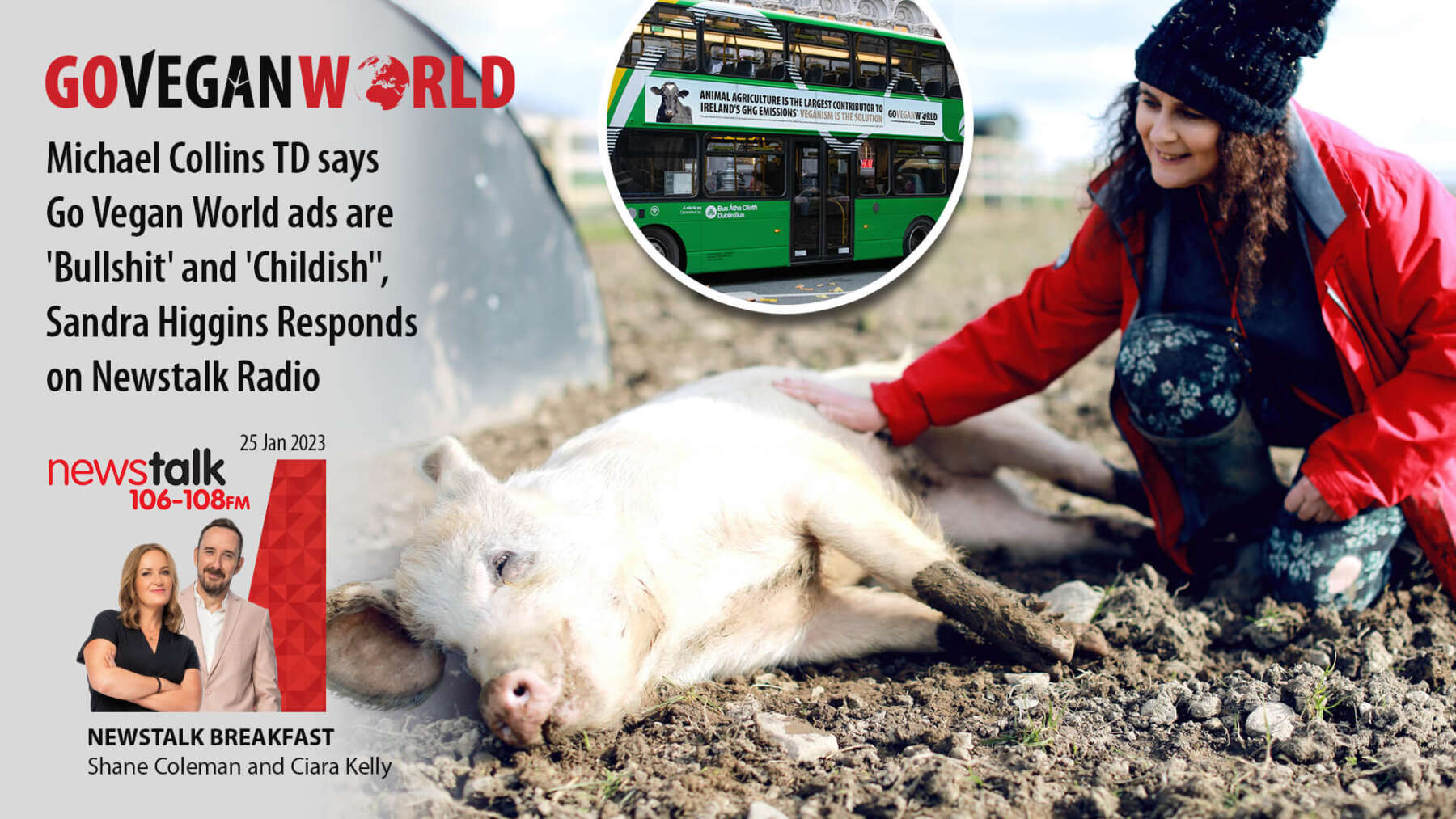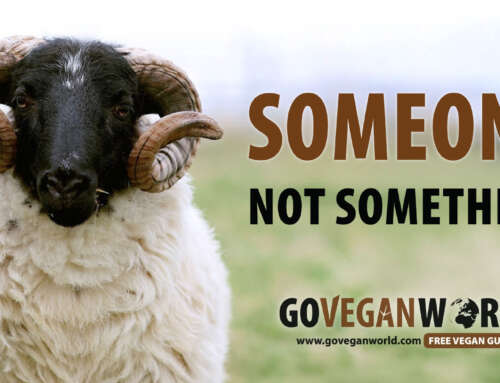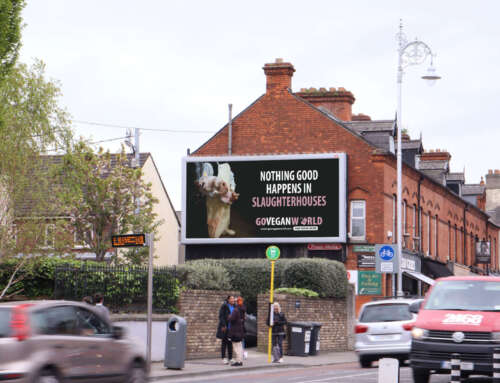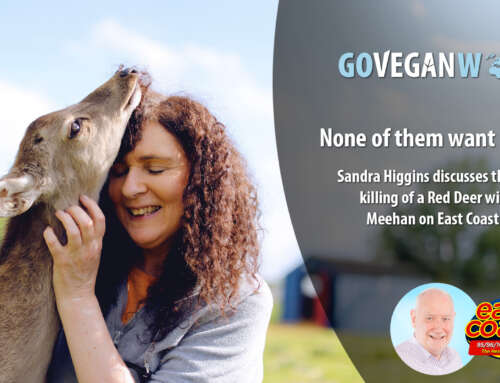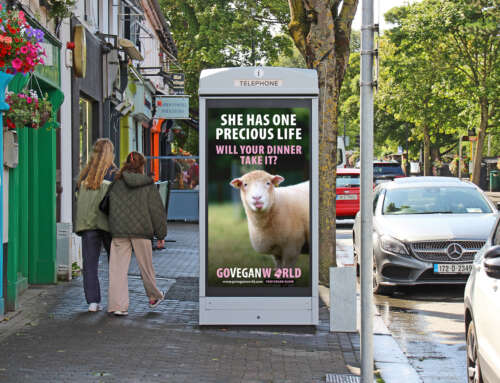Independent TD Michael Collins recently referred to our 2023 New Year campaign as ‘Bullshit’, ‘Childish’, ‘part of a sustained and ongoing ideological assault on Irish agriculture’, ‘fringe idiocy’, and a ‘childishly misinformed narrative’. He has called on Dublin Bus to remove our ads.
Sandra Higgins, Director of Go Vegan World, responded on Newstalk Radio. You can listen to the interview here and the following is a more extensive exploration of the background on the repeated criticism of Go Vegan World’s campaigns.
Similar complaints made in Northern Ireland by a member of the DUP a few weeks ago about our Dairy Takes Babies ad. Go Vegan World faces this kind of criticism every time we run a campaign. Veganism is a progressive position. It is unlikely to get the support of socially conservative politicians.
Our 2023 Campaign
Go Vegan World’s 2023 New Year campaign in Ireland is on billboards and 100 nationwide buses. It focuses on two ads: Dairy Takes Babies from Their Mothers and our GHG Emissions ad.
Dairy Takes Babies from Their Mothers
We have discussed our Dairy Takes Babies from their Mothers ad several times. Surprisingly, most of us believe that cows just produce milk and that farmers do them a favour when they milk them. Just as we believe hens just lay eggs and we are entitled to take them from them. The industry very carefully hides the facts from us. Dairy involves impregnating cows so that they will give birth and lactate. But their calves are taken from them so they cannot drink the milk that is sold to humans for profit. Cows are selectively bred to produce far more milk than they would produce naturally to feed their calves. Farmers claim that if they left the calves with their mothers, they would consume too much milk and have digestive problems. They portray themselves as doing calves a favour by separating them. This is a far cry from the science of the dairy industry. It is common sense that a mother will grieve piteously if her child is taken from her, and that new born babies of any species need their mothers.
Dairy Takes Babies From Their Mothers is our most effective ad. When people write to us to tell us they went vegan when they saw one of our ads, this is usually the ad that prompted them to think about the issue and research it for themselves. Most people are not aware of the pain they cause other animals when they use them. They are aware that animals are killed for their ‘meat’ or flesh but they are not aware that they are also killed in the dairy and egg industries. They are not aware of the atrocities that are part and parcel of the status quo of using other animals as if they were our resources.
We have faced objection from farming bodies since the inception of Go Vegan World. This is not the first time representatives of the industry have tried to silence us. In 2020, Translink in Northern Ireland removed our ads following complaints by the Ulster Farmers; Union. But they had to backtrack when challenged by us on their unlawful interference to our right to freedom of expression. Similarly, in a landmark ruling in the UK in 2018, our ad on the dairy industry was found to be entirely accurate. Interested readers can access our submission to the ASA and learn more about our ad here.
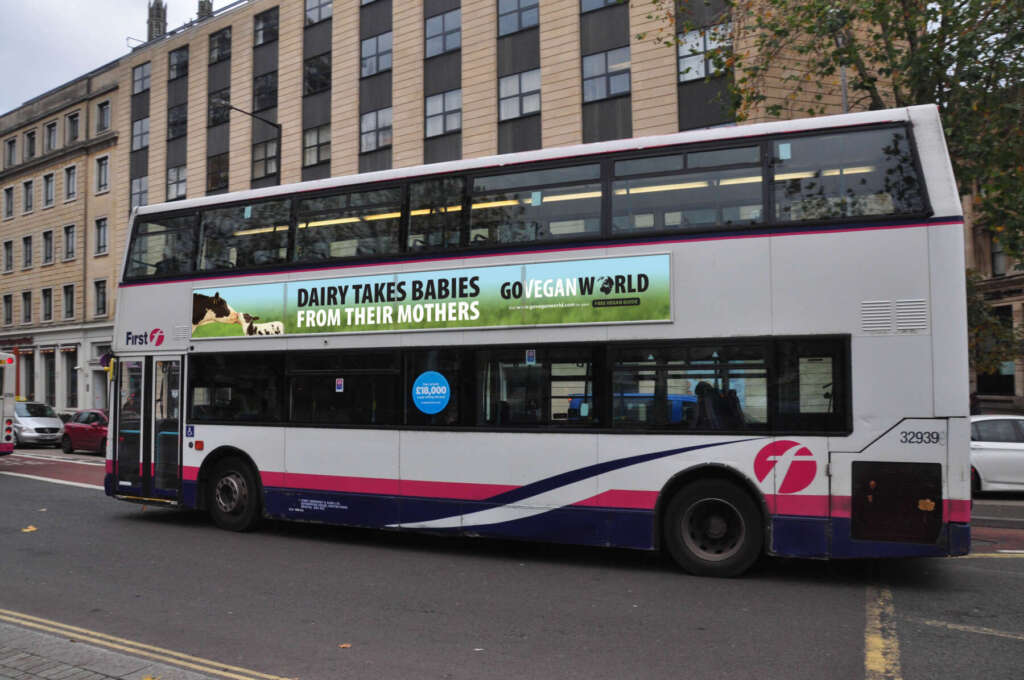
Animal Agriculture & GHG Emissions
Our second ad informs members of the public that animal agriculture is by far the largest contributor to Ireland’s total emissions. Agriculture Emissions are 37.5%, the majority of which are attributable to animal agriculture that meets the non-vegan demand for eggs, fish, animal flesh and dairy. The Transport and Energy GHG emissions in Ireland contribute far less at 17.7 and 16.7% respectively. Most people imagine that tackling energy and transport emissions is the most effective thing they can do to be more environmentally friendly. So they have shorter showers, cycle to work, use their dishwasher and tumble dryer as little as possible. We would like them to be aware that changing what they eat by transitioning away from animal products to a plant based, vegan diet, is the easiest and most effective action they can take.
We believe it is the right of everyone in Ireland to know these facts.
There is No Scientific Debate: Animal Agriculture is Extremely Harmful
Our ads are not an attack on Irish farming or farmers. The global statistics are similar; the latest UN report shows that the agrifood sector contributes 31% of human caused climate emissions.
Animal Agriculture uses 83% of the world’s agricultural land, but delivers only 18% of our calories (Poore et al, Science, 2018). Using cows for their flesh (“beef”) uses 60% of the world’s agricultural land but accounts for less than 2% of the calories and 5% of the protein consumed worldwide. (Source: Union of Concerned Scientists). Plant foods use significantly less resources than animal products; therefore they cause less environmental destructions, loss of biodiversity, and contribute less GHG emissions. It takes around 100 times as much land to produce a kilocalorie of flesh from a cow or sheep versus plant-based alternatives (Poore, J., & Nemecek, T. (2018). Reducing food’s environmental impacts through producers and consumers. Science, 360(6392), 987-992. Quoted in https://ourworldindata.org/land-use-diets).
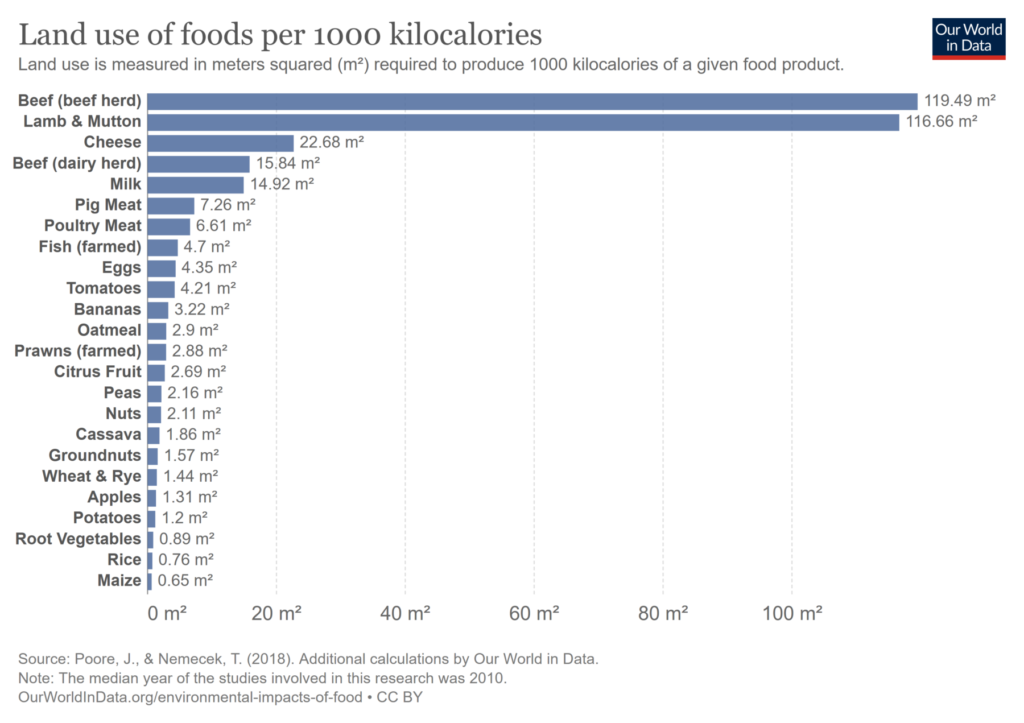
(Poore, J., & Nemecek, T. (2018). Reducing food’s environmental impacts through producers and consumers. Science, 360(6392), 987-992. Quoted in https://ourworldindata.org/land-use-diets).
Animal Agriculture Replicates the Tobacco Industry Tactics
The science is very clear. If we do not change what we eat, by transitioning to a plant-based diet, we will not be able to address the problem of climate change. This fact should not be threatening to farmers who are needed more than ever to produce plant foods, engage in non-animal agriculture, and cater for our growing population. But it is threatening to the animal agriculture industry, that has a vested interest in maintaining the status quo.
We have long observed that the tactics of the industry replicate those of the tobacco and fossil fuel industries. The repeated insults, attacks and challenges faced by Go Vegan World are heavily influenced by communications groups, engaged in a carefully orchestrated effort to portray animal products as harmless, normal, natural, necessary, and nice. Veganism is denigrated, plant-based diets are criticised, and campaigns such as Go Vegan World are portrayed as ‘extremist’ and ‘an attack on farmers’.
These miscommunications from the industry very carefully plant seeds of doubt in the public mind, often using sensational headlines claiming that plant-based diets are deficient in nutrients (they are not*) or by denigrating plant-based substitutes for animal products such as plant milk, burgers, cheese and steaks, These are the very products that, while not essential for a nutritious plant diet, are convenient and make the transition very easy. A recent study of 57,000 of the foods available in UK and Irish supermarkets, found that even processed plant foods are lower in GHG emissions than animal products (Clark, M, Springmann, M, Raner M, Harrington, R (2022) Estimating the environmental impacts of 57,000 food products, Proceedings of the National Academy of Sciences (PNAS), Vol 119, No 33.)
Another very interesting study by researchers at the London School of Hygiene & Tropical Medicine, entitled‘ Meat, money and messaging: How the environmental and health harms of red and processed meat consumption are framed by the meat industry, reveals attempts to shape perception and influence policy decisions about red and processed meat consumption.
It found that the UK ‘Meat’ Industry relies on well-worn tactics to spread misinformation and plant seeds of doubt. Despite the overwhelming evidence that animal flesh causes health issues, is environmentally destructive, and contributes disproportionately to loss of biodiversity and green house gas emissions, the industry portrays ‘meat’ as harmless and beneficial. The study reviewed twenty six public documents by six representative bodies of the meat industry, such as the National Farmers Union (NFU) and the Agriculture and Horticulture Development Board’s (AHDB) in which they discussed the environment or health. The documents showed that they cast doubt on the risks and flaws of animal flesh production and consumption; undermine the benefits of reducing the numbers of animals farmed; and portrayed British animal agriculture as among the most sustainable in the world. Anyone reading the Irish Farmers Journal every week, or listening to any farming body influenced by the likes of Frank Mitloehner, will recognise the rhetoric. It is repeated back to us at Go Vegan World very frequently; the interview that is the subject of this article is an example. Like the tobacco and fossil fuel industries, their communication tactics
- underplay the harm their products cause,
- portray their products as harmless and beneficial e.g., most sustainable in the world
- pretend there is still debate about the harm.
- sow seeds of confusion so that consumers keep purchasing their products
The effect of arguing over and back, in the pretence that there is a debate about the issue about which the science is very clear, has the effect of postponing the inevitable transition to plant based agriculture and diet. It delays securing the subsidies and supports farmers need to transition, reassuring them of a viable livelihood, and it wastes valuable time when we could educate members of the public, particularly young children, about how to incorporate a plant based diet into their lives and the ethical imperative to be vegan.
Each of Us Has One Precious Life

When farming bodies, and those who represent them, object because the facts of their work and the science of its effects are publicised on the side of a bus; when they attempt to take down the message and silence the messenger, members of the public should question what they are hiding and what they, as non-vegans, are supporting with their money.
Go Vegan World is careful to ensure that all its messages are accurate. We do not pretend to be environmental or farming experts. Our remit is to do what we can to help members of the public connect with the animals we treat as resources, recognise that they are feeling individuals, and stop using them. The fact that animal agriculture is linked to GHG emissions, climate change, and environmental destruction falls within our remit as an intersectional aspect of animal use that puts all of life, human, and non-human at risk. Life will be extremely difficult as the consequences of our lifestyles impact on us through climate change. Go Vegan World has nothing to gain if members of the public follow our recommendation and go vegan. But the animals who live torturous lives and are killed in their millions in Ireland every year, have everything to gain. Surely the most meaningful thing any of us has is our life? It is only when we come close to losing our own, or someone we love, that its importance resonates with us.
References:
Kathryn Clare, Nason Maani, James Milner, (2022) Meat, money and messaging: How the environmental and health harms of red and processed meat consumption are framed by the meat industry, Food Policy, Volume 109 https://www.lshtm.ac.uk/newsevents/news/2022/messaging-uk-meat-industry-undermining-evidence-environmental-and-health Accessed 25th January 2023
Clark, M, Springmann, M, Raner M, Harrington, R (2022) Estimating the environmental impacts of 57,000 food products, Proceedings of the National Academy of Sciences (PNAS), Vol 119, No 33.)
Melino, V, Craig, W, Levin, S, (2016) Position of the Academy of Nutrition and Dietetics: Vegetarian Diets , Journal of the Academy of Nutrition and Dietetics, 2016;116:1970-1980.
Poore, J., & Nemecek, T. (2018). Reducing food’s environmental impacts through producers and consumers. Science, 360(6392), 987-992. Quoted in https://ourworldindata.org/land-use-diets.
Francesco N. Tubiello et al. (2022) Pre- and post-production processes increasingly dominate greenhouse gas emissions from agri-food systems Earth Syst. Sci. Data, 14, 1795–1809, 2022. https://news.un.org/en/story/2021/11/1105172 Accessed 25th January 2023
*See Melino, V, Craig, W, Levin, S, (2016) Position of the Academy of Nutrition and Dietetics: Vegetarian Diets , Journal of the Academy of Nutrition and Dietetics, 2016;116:1970-1980 and https://goveganworld.com/living-vegan/nutrition

